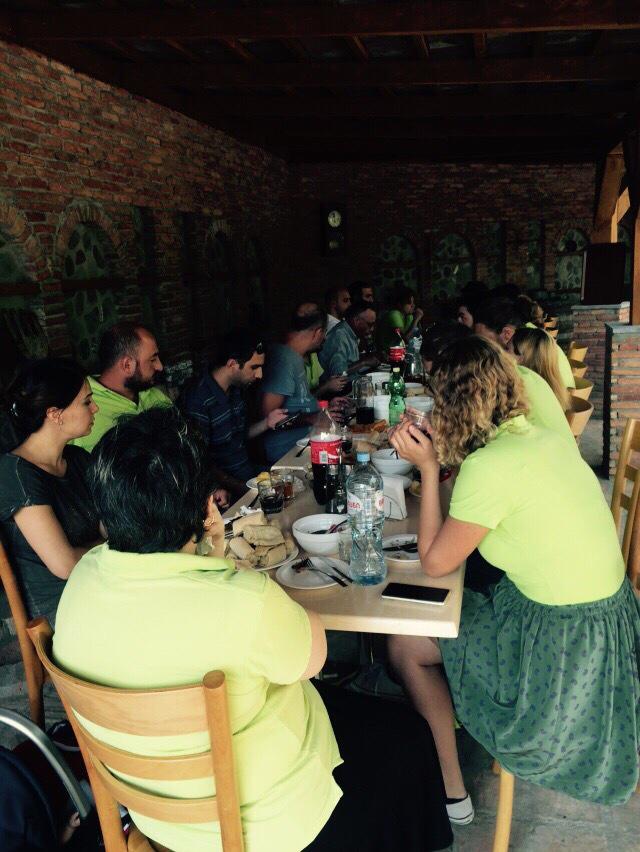For my own writing freedom, I decided to have a German article… it’s easier to include a wide array of quotes from Faust in German, than being forced to translate everything first. But considering it a very delicate subject, that needs a lot of attention there should be an English version in the future.
Of course I’m talking about something rather outstanding about Georgian culture: Alcohol!
“Es lebe die Freiheit! Es lebe der Wein!”, wohl eines der bedeutensten Zitate aus Goethes Faust, dem nicht genügend Aufmerksamkeit geschenkt wird. Besonders in Schulklassen wird es fast grundsätzlich außer Acht gelassen. Dabei zeichnet der Wein und der Alkohol ganze Gesellschaften. Georgien ist da keine Ausnahme: “Dem schönen Land des Weins und der Gesänge” hebt man hier öfters mal ein Glas oder mehr. Jedoch nicht bloß Georgien, vor allem nicht in internationaler Gesellschaft. Getrunken wird auf jeden Fall, sei es Wein, Bier, Chacha oder Vodka.
Bevor ich auf Traditionen zu sprechen komme, wäre es ratsam sich über den Ursprung des Weines zu informieren: Georgien behaupten immer stolz, die seinen die ersten gewesen, die Wein produzierten (es herrscht ein regelrechter Streit zwischen Georgiern und Armeniern über den Ursprung dieses Getränkes). Mit Sicherheit ließ sich nur feststellen, dass die ersten Amphoren die Weinpartikel enthielten aus Georgien stammen und man ermittelte ein Alter von rund 9000 Jahren. Auch ist die Auswahl an Weinreben enorm. Es ist nicht umsonst, dass praktisch jede Familie ihren eigenen Wein produziert… und diesen dann im Kreise der Familie und Freunde genießt.
“Trauben trägt der Weinstock! Hörner der Ziegenbock;
Der Wein ist saftig,
Holz die Reben”
Die georgische Art des Trinkens unterscheidet sich von der gewöhnlichen, da man versucht die Leute, die um einen herumsitzen, mit einzubeziehen. Dies wird grundsätzlich mit Toasts vollbracht. Während man in der Runde sitzt (gewöhnlich um Tische die mit Unmengen an kulinarischen Gerichten bedeckt sind), werden die Gläser – mit beispielsweise Wein – gefüllt um damit zu prosten. Generell wird Augenkontakt tunlichst vermieden. Dann folgt ein Toast, gesprochen vom Tamada (dem Toastmeister). Anschließend wird das Glas dann ausgetrunken bis auf den letzten Tropfen. Kaum hat man den Inhalt des Glases vernichtet, folgt eine kürzere Zeit um etwas Festes zu sich zu nehmen, bis die nächste Runde startet; ein Zyklus, dem man sich schwer entziehen kann und der den ganzen Abend kontinuierlich weitergeht.

Wie wird ein solcher Toast vollzogen?
Es existiert eine ungeschriebene Reihenfolge, an die sich praktisch jeder Tamada orientiert. Auch gibt es eine Reihe von Toast, die man unbedingt erwähnen sollte. Mehrfach fängt man mit Frieden zwischen verschiedenen Nationen, dann folgt ein Toast auch die Freundschaft. Später wird ein Trinkspruch auf die Liebe gesprochen. Dies stellt normalerweise den Anfang eines jeden Gelages dar. Nicht zu vergessen sind auch Sprüche auf die kürzlich Verstorbenen, derer man nach ihrem Tode noch gedenkt (man bedenke auch, dass ein jedes Begräbnis mit einer festlichen Tafel und viel Wein ended. Bereits sehr kurz nach der eigentlichen Bestattung fängt das Gedenken an; allerdings wird der/die Verstorbene erst einige Tage nach dem Tode zu Grabe gebracht, da der Leichnam in der Zwischenzeit von Freunden und Familie bei sich zuhause aufgesucht werden kann)
Des Weiteren wird auch an verschiedenen Anlässen auch aus anderen Behältern getrunken, nämlich den “Hörner der Ziegenbock”. Diese werden allerdings nur mit Wein und Brandy gefüllt.
Schließlich gibt es die Tradition der gekreutzen Arme, das sogenannte Vakhtanguri, benannt nach dem georgischen König Vakhtang VI. Dabei kreutzt man die Arme mit einem wohlgesinntenen Trinkkumpanen und das Glas – respektiv Horn – wird ausgetrunken. Diese Tradition kann auch mit mehreren Leuten durchgeführt werden (so habe ich persönlich bereits mit einem, respektiv zwei Leuten gleichzeitig diesen Brauch vollzogen).
Am Ende eines jeden Supra (Mahl, mit viel Wein und Essen) fühlt man sich dann der ganzen Trinkgesellschaft und Kultur näher als zuvor… sollte man nicht mit dem Kopf an der Brust entschlafen. Für Weitere Informationen auf diesem Gebiet, will ich es nicht versäumen einen Artikel von Martin Sonneborn (Parteivorsitzender für Die Partei) zu hinterlassen, der die gesamte Prozedur aufs Beste wiedergibt:
http://www.spiegel.de/kultur/gesellschaft/spam-satiriker-sonneborn-gelage-mit-korrupten-georgiern-a-609220.html
Hier ein kleiner Auszug: “Alle anderen trinken ihre Gläser leer. Mit verheerenden Folgen: Zehn Minuten später müssen wir die deutsche Kanzlerkandidatin vor den Zudringlichkeiten des Tamadas retten, unser Wahlkampfleiter kippt zur Seite und vom Stuhl, die übrigen Schnapstrinker schlafen friedlich, den Kopf auf der Brust. Wir betten sie bequem.”
“Damit du siehst, wie leicht sich’s leben läßt. Dem Volke hier wird jeder Tag ein Fest.”
In der Tat hat man manchmal die Auffassung, dass der gemeine Georgien doch ein recht glückliches Wesen ist, besonders wenn es etwas zu Trinken gibt. Allerdings ist der Prozentsatz an Alkoholikern in Georgien doch vergleichbar niedriger, vermutlich weil man hier nie alleine trinkt. Statistiken beweisen auch, dass der Alkoholkonsum in Georgien deutlich geringer ist als im Nachbar Russland. Verbringt man erst mal eine gewisse Zeit in Georgien, kommt einem das unmöglich vor, da man dem Alkoholkonsum fast nicht entkommen kann. Und sollte man sich einmal entschließen selbst nicht zu trinken, wird man fast immer von einem Freund oder Nachbar auf den rechten Weg der Tugend zurückgebracht.
Als Fremder in Georgien wird man recht oft mit einer problematischen Verständigung konfrontiert, da beide Parteien (Ausländer und Georgier) nicht eine gleiche Sprache sprechen und so in Zeichensprache kommunizieren müssen. Abgesehen von dieser kleinen Barriere, lässt es sich doch recht leicht leben mit praktisch jeder Sicht der georgischen Gesellschaft.
Es lässt sich zusammenfassen: In Georgien ist der Wein geschätzt, sowie die Traditionen die damit einhergehen. Daher wird auch fast ausschließlich in Gruppen getrunken (allerdings manchmal zu jeder möglichen Tageszeit), sei es nun unter Freunden, Familienmitgliedern oder beidem. Das Betrinken gehört zur Kultur und trägt zur Freundschaft und besseren gesellschaftlichen Kontakten bei. Man sollte auch anmerken, dass Frauen normalerweise weniger trinken, manchmal sogar überhaupt nichts, da sie es sind, die sich während den Festlichkeiten um die Kinder kümmern (Kleinkinder sind keine Ausnahme während den Supras).
Persönlich habe natürlich auch einige Erfahrungen auf diesem Gebiet gemacht. Von überraschenden Nachbarn, die einen zu Wein und Abendessen einladen, obwohl sie zum allerersten Mal sieht; Supras auf der Arbeit mit den wichtigsten Leuten des Scout’s Center; eine Vielzahl an verschiedenen Weinen, die immer auf ihre Art einzigartig sind; billigstem Wein den man während einer Reise in die Berge… “genießt”; das erste Bier nach einige Tagen in den Bergen; das letzte Bier bevor man sich auf eine bedenkliche Höhe wagt….
Nach fast 3 Monaten in Georgien kommen langsam aber sicher Zweifel auf: Hat mein Geschmack sich dermaßen verändert? Liegt es an einer anderen Lebensweise? Ist es die Luft, die nicht mehr die Gleiche ist? War es Chacha?
Ganz gleich woran es liegt, es gilt festzuhalten, dass mir das georgische Bier sehr angetan hat. Internationales, normalerweise überaus wohlschmeckender Hopfensaft (wie Erdinger oder Baltika) sind mir zuwider, obwohl dies einige Monate zuvor noch komplet anders war. Mein Geschmack hat sich verändert.






